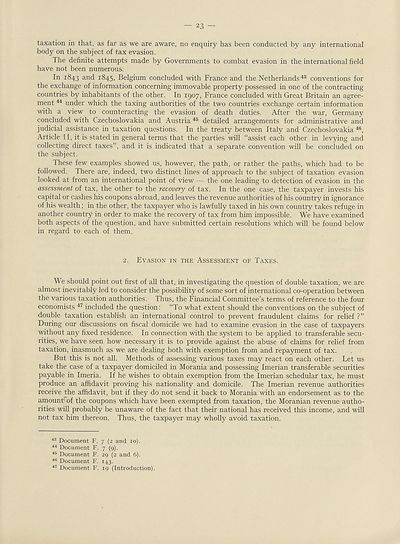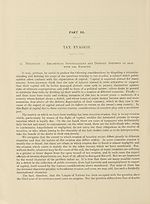Download files
Complete book:
Individual page:
Thumbnail gallery: Grid view | List view

23 —
taxation in that, as far as we are aware, no enquiry has been conducted by any international
body on the subject of tax evasion.
The definite attempts made by Governments to combat evasion in the international field
have not been numerous.
In 1843 and 1845, Belgium concluded with France and the Netherlands 43 conventions for
the exchange of information concerning immovable property possessed in one of the contracting
countries by inhabitants of the other. In 1907, France concluded with Great Britain an agree¬
ment 44 under which the taxing authorities of the two countries exchange certain information
with a view to counteracting the evasion of death duties. After the war, Germany
concluded with Czechoslovakia and Austria 45 detailed arrangements for administrative and
judicial assistance in taxation questions. In the treaty between Italy and Czechoslovakia 46,
Article 11, it is stated in general terms that the parties will “assist each other in levying and
collecting direct taxes”, and it is indicated that a separate convention will be concluded on
the subject.
These few examples showed us, however, the path, or rather the paths, which had to be
followed. There are, indeed, two distinct lines of approach to the subject of taxation evasion
looked at from an international point of view — the one leading to detection of evasion in the
assessment of tax, the other to the recovery of tax. In the one case, the taxpayer invests his
capital or cashes his coupons abroad, and leaves the revenue authorities of his country in ignorance
of his wealth; in the other, the taxpayer who is lawfully taxed in his own country takes refuge in
another country in order to make the recovery of tax from him impossible. We have examined
both aspects of the question, and have submitted certain resolutions which will be found below
in regard to each of them.
2. Evasion in the Assessment of Taxes.
We should point out first of all that, in investigating the question of double taxation, we are
almost inevitably led to consider the possibility of some sort of international co-operation between
the various taxation authorities. Thus, the Financial Committee’s terms of reference to the four
economists 47 included the question: “To what extent should the conventions on the subject of
double taxation establish an international control to prevent fraudulent claims for relief ?”
During our discussions on fiscal domicile we had to examine evasion in the case of taxpayers
without any fixed residence. In connection with the system to be applied to transferable secu¬
rities, we have seen how necessary it is to provide against the abuse of claims for relief from
taxation, inasmuch as we are dealing both with exemption from and repayment of tax.
But this is not all. Methods of assessing various taxes may react on each other. Let us
take the case of a taxpayer domiciled in Morania and possessing Imerian transferable securities
payable in Imeria. If he wishes to obtain exemption from the Imerian schedular tax, he must
produce an affidavit proving his nationality and domicile. The Imerian revenue authorities
receive the affidavit, but if they do not send it back to Morania with an endorsement as to the
amounfbf the coupons which have been exempted from taxation, the Moranian revenue autho¬
rities will probably be unaware of the fact that their national has received this income, and will
not tax him thereon. Thus, the taxpayer may wholly avoid taxation.
43 Document F. 7 (2 and 10).
44 Document F. 7 (9).
45 Document F. 29 (2 and 6).
40 Document F. 143.
47 Document F. 19 (Introduction).
taxation in that, as far as we are aware, no enquiry has been conducted by any international
body on the subject of tax evasion.
The definite attempts made by Governments to combat evasion in the international field
have not been numerous.
In 1843 and 1845, Belgium concluded with France and the Netherlands 43 conventions for
the exchange of information concerning immovable property possessed in one of the contracting
countries by inhabitants of the other. In 1907, France concluded with Great Britain an agree¬
ment 44 under which the taxing authorities of the two countries exchange certain information
with a view to counteracting the evasion of death duties. After the war, Germany
concluded with Czechoslovakia and Austria 45 detailed arrangements for administrative and
judicial assistance in taxation questions. In the treaty between Italy and Czechoslovakia 46,
Article 11, it is stated in general terms that the parties will “assist each other in levying and
collecting direct taxes”, and it is indicated that a separate convention will be concluded on
the subject.
These few examples showed us, however, the path, or rather the paths, which had to be
followed. There are, indeed, two distinct lines of approach to the subject of taxation evasion
looked at from an international point of view — the one leading to detection of evasion in the
assessment of tax, the other to the recovery of tax. In the one case, the taxpayer invests his
capital or cashes his coupons abroad, and leaves the revenue authorities of his country in ignorance
of his wealth; in the other, the taxpayer who is lawfully taxed in his own country takes refuge in
another country in order to make the recovery of tax from him impossible. We have examined
both aspects of the question, and have submitted certain resolutions which will be found below
in regard to each of them.
2. Evasion in the Assessment of Taxes.
We should point out first of all that, in investigating the question of double taxation, we are
almost inevitably led to consider the possibility of some sort of international co-operation between
the various taxation authorities. Thus, the Financial Committee’s terms of reference to the four
economists 47 included the question: “To what extent should the conventions on the subject of
double taxation establish an international control to prevent fraudulent claims for relief ?”
During our discussions on fiscal domicile we had to examine evasion in the case of taxpayers
without any fixed residence. In connection with the system to be applied to transferable secu¬
rities, we have seen how necessary it is to provide against the abuse of claims for relief from
taxation, inasmuch as we are dealing both with exemption from and repayment of tax.
But this is not all. Methods of assessing various taxes may react on each other. Let us
take the case of a taxpayer domiciled in Morania and possessing Imerian transferable securities
payable in Imeria. If he wishes to obtain exemption from the Imerian schedular tax, he must
produce an affidavit proving his nationality and domicile. The Imerian revenue authorities
receive the affidavit, but if they do not send it back to Morania with an endorsement as to the
amounfbf the coupons which have been exempted from taxation, the Moranian revenue autho¬
rities will probably be unaware of the fact that their national has received this income, and will
not tax him thereon. Thus, the taxpayer may wholly avoid taxation.
43 Document F. 7 (2 and 10).
44 Document F. 7 (9).
45 Document F. 29 (2 and 6).
40 Document F. 143.
47 Document F. 19 (Introduction).
Set display mode to:
![]() Universal Viewer |
Universal Viewer | ![]() Mirador |
Large image | Transcription
Mirador |
Large image | Transcription
Images and transcriptions on this page, including medium image downloads, may be used under the Creative Commons Attribution 4.0 International Licence unless otherwise stated. ![]()
| League of Nations > Economic and financial section > Double taxation and tax evasion > (29) |
|---|
| Permanent URL | https://digital.nls.uk/190911685 |
|---|
| Shelfmark | LN.II |
|---|
| Description | Over 1,200 documents from the non-political organs of the League of Nations that dealt with health, disarmament, economic and financial matters for the duration of the League (1919-1945). Also online are statistical bulletins, essential facts, and an overview of the League by the first Secretary General, Sir Eric Drummond. These items are part of the Official Publications collection at the National Library of Scotland. |
|---|---|
| Additional NLS resources: |
|

